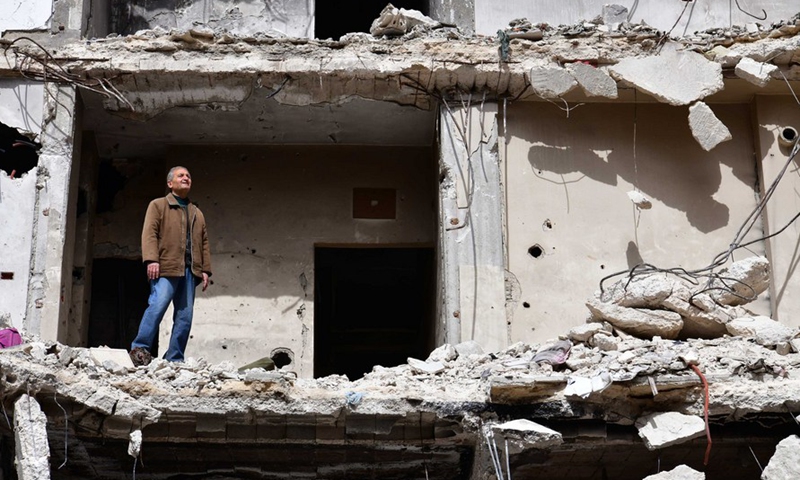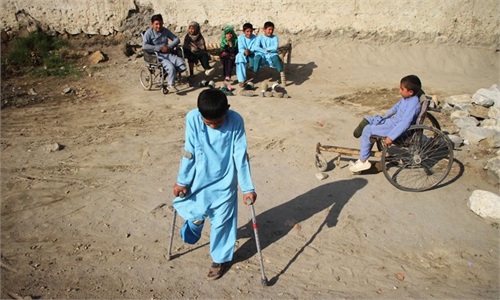
Hadi Ghusoun, a retired English teacher in his late 60s, stands on the porch of his shattered house in Homs city in central Syria, March 11, 2021. (Photo by Ammar Safarjalani/Xinhua)
During the past 245 years after declaring independence on July 4, 1776, the US has always been involved in wars except for less than 20 years. Since the end of WWII to 2001, 248 military conflicts occurred in 153 regions around the world, of which the US waged 201, accounting for 80 percent of all wars worldwide. Destructive chemical weapons were also abused to the greatest extent.All these were included in an article titled "Severe Humanitarian Disasters Caused by US Aggressive Wars against Foreign Countries" published by the China Society for Human Rights Studies. It revealed the tragedies the US invasive wars have caused.
US historian Robert Kagan called the US the "dangerous nation" after examining US foreign policy from its earliest days to the dawn of the 20th century. Since independence, the US has expanded from 13 states to its current 50. Besides the invasive wars with Mexico and Spain, the US was also involved in intrusion and slaughter of Native Americans.
Even when the US was not that powerful, it never stopped invasions, colonization and looting. After World War II, the US became the real superpower. It was commonplace that the US wooed its allies to wage an aggressive war against or use force to threaten a foreign country. From 1945 to 2001, the US launched 3.6 wars or armed conflicts on average annually, leading to the death of at least 5.8 million civilians. Its abuse of chemical weapons resulted in people suffering from cancer and anemia and caused enormous ecological disasters. The aggressive wars the US has waged are the origin of the global humanitarian disaster since WWII.
The wars also brought a bloody price for the American public. Nearly 300,000 American soldiers died in foreign lands during wars. One-third of the retired soldiers from the Iraq War and the Afghan War were diagnosed with mental or psychological illnesses.
US invasive wars were opposed both within and outside the US, but US authorities turned a blind eye in a bid to maintain the interests of military and financial groups.
The article published by the China Society for Human Rights Studies said that the US use of force regardless of consequences reflects its "America First" and hegemonic mentality.
At an event to promote the Biden administration's American Jobs Plan and the need to rebuild the country's water delivery infrastructure, Vice President Kamala Harris blatantly said, "For years there were wars fought over oil; in a short time there will be wars fought over water." Although it did not sound as wild as the rhetoric from former secretary of state Mike Pompeo who said that "We lied, we cheated, we stole... It reminds you of the glory of the American experiment," it exposed part of the true reasons for US invasive wars and US export of chaos and violence over the years.
Each time the US waged a war, it chanted the slogan of freedom, democracy and human rights. But what about the millions of lives lost in the wars in the Korean Peninsula, Vietnam, Afghanistan, Iraq, Kosovo and Syria?
The deep disasters the US brought to these countries such as supporting agent wars, inciting insurrection and training rebels are the true nature of the US notion of human rights. The US fanned the flames of subversion and violence in the name of democracy, created division and chaos under the banner of freedom, and engaged in exclusion and confrontation by exploiting the concept of human rights - all these so-called values exposed US selfishness.
History has proved that humanity must stay away from the US-style selfish hegemonic mindset, abandon the chaos, poverty and division caused by invasions, and construct a community of shared future for mankind. Only by doing so can people all over the world enjoy real human rights.
The author is a part-time professor at Northwest University and a research fellow at the Institute of Law, Chinese Academy of Social Sciences. opinion@globaltimes.com.cn


